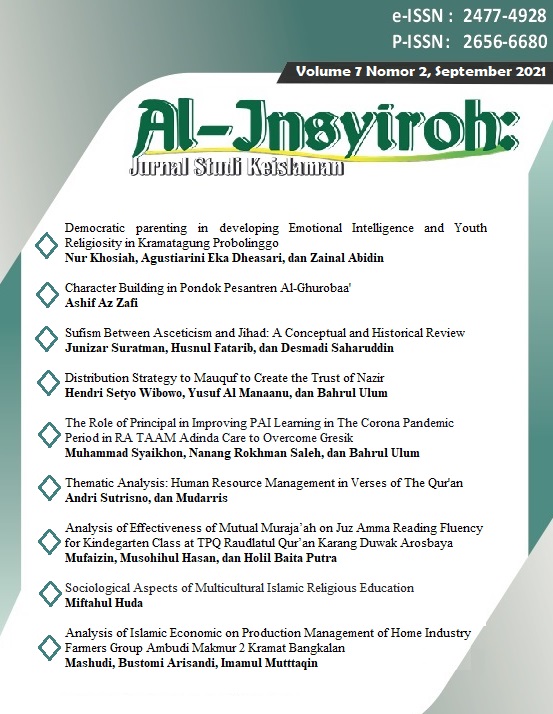Thematic Analysis: Human Resource Management in Verses of The Qur'an
DOI:
https://doi.org/10.35309/alinsyiroh.v7i2.4991Keywords:
Human Understanding, Human Character, , Human Resource ManagementAbstract
Human resource management is a process of managing human resources or a potential within humans to realize desired goals in groups. In the Qur'an, it is explained that man is the creation of Allah Almighty. Who is perfect from other beings. Management science is part of the social film, so it is very closely related to human resources. The most influential actor in the management process is the man himself. So that human resource management becomes critical in success to achieve the goals aspired by each group. Islam is a religion that provides various solutions for human affairs, especially in the process of human resource management in its holy book, the Qur'an. Thus in this article, researchers use literature research that examines and analyzes books related to human resource management from the perspective of Quranic verses. So it can be concluded that in the management of human resources in the verses of the Qur'an, there are four processes, namely planning, selection and placement, development, and compensation.References
Departemen Agama RI, Al-Qur’an Dan Tafsirnya, II (Jakarta: Menara Kudus, 2008)
Dewi Oktayani, ‘Manajemen Sumber Daya Manusia Dalam Perspektif Islam’, Manajeria, 2.1 (2016), 170–86
Dhoni Kurniawati, ‘Manajemen Sumberdaya Manusia Dalam Perspektif Islam Dan Relevansinya Dengan Manajemen Modern’, Ijtimaiyya: Jurnal Pengembangan Masyarakat Islam, 11.1 (2018), 19–40 <https://doi.org/10.24042/ijpmi.v11i1.3414>
Fantika Vera Entrisnasari, Fantika Febry Puspitasari dan Supriyanto, ‘DAYA MANUSIA PERSPEKTIF AL- QUR ’ AN’, Istawa: Jurnal Pendidikan Islam, 1.2 (2016), 210–25
Haluty, Djaelany, ‘Islam Dan Manajemen Sumber Daya Manusia Yang Berkualitas’, Jurnal Irfani, 2014, 63–74
Hasan Al-Banna’, Risalah Ilaa As-Shabab (Mesir: Daar As-Shihab, 1977)
Hasan, Musohihul. "Nilaiâ€nilai Pendidikan Islam dalam Maulid Nabi Muhammad SAW." Al-Insyiroh: Jurnal Studi Keislaman 1.1 (2015): 180-213.
Ismail, Miftahul Ulum, ‘Metodologi Pengawasan Dengan Pendekatan Agama Dalam Dunia Pendidikan’, Al-Insyiroh: Jurnal Studi Keislaman, 6.2 (2020), 127–43 <https://doi.org/10.35309/alinsyiroh.v6i2.3836>
Khotibul Umam, ‘Manajemen Sumber Daya Manusia (Sebuah Sudut Pandang Dalam Tinjauan Islam)’, Jurnal-Mpai, 1.3 (2017), 1–16
M. Quraish Shihab, Tafsir Al-Misbah Pesan, Kesan, Dan Keserasian Al-Qur’an, Volume 15 (Tangerang: PT. Lentera Hati, 2017)
———, Wawasan Al-Qur’an Tafsir Tematik Atas Pelbagai Persoalan Umat (Bandung: Mizan, 2013)
Muhammad Anis, Tafsir Ayat-Ayat Pendidikan (Yogyakarta: Mentari Pustaka, 2012)
Mulyadi Kartanegara, Lentera Kehidupan (Panduan Memahami Tuhan, Alam Dan Manusia) (Bandung: Mizan Pustaka, 2017)
Mulyono, Manajemen Administrasi Dan Organisasi Pendidikan (Yogyakarta: Ar-Ruzz Media, 2008)
Noeng Muhadjir, Ilmu Pendidikan Re-Interpretif Phenomenologik, VI (Yogyakarta: Rake Sarasin, 2013)
Ramdhan, Tri Wahyudi, ‘Desain Kurikulum Pendidikan Islam Berbasis Tauhid’, Al-Insyiroh: Jurnal Studi Keislaman, 5.1 (2019), 118–34 <https://doi.org/10.35309/alinsyiroh.v5i1.3400>
Ramdhan, Tri Wahyudi. "Dimensi Moderasi Islam." Al-Insyiroh: Jurnal Studi Keislaman 2.2 (2018): 29-48.
Sakban, Ifnaldi Nurmal, and Rifanto Bin Ridwan, ‘Manajemen Sumber Daya Manusia’, Journal of Administration and Educational Management (Alignment), 2.1 (2019), 93–104 <https://doi.org/10.31539/alignment.v2i1.721>
Siagian, Sondang P., Filsafat Administrasi (Jakarta: Haji Masagung, 1987)
Sucipto, ‘Konsep Manajemen Sumber Daya Manusia (MSDM) Dalam Perspektif Syariah’, At-Tahdzib : Jurnal Studi Islam Dan Mu’amalah, 8.1 (2020), 61–80
Zainal Arifin, Tafsir Ayat-Ayat Manajemen (Yogyakarta: Rosda Karya, 2019)
———, Tafsir Ayat-Ayat Manajemen (Yogyakarta: Rosda Karya, 2019)
Downloads
Published
How to Cite
Issue
Section
License
Copyright (c) 2021 Al-Insyiroh: Jurnal Studi Keislaman

This work is licensed under a Creative Commons Attribution-ShareAlike 4.0 International License.

This work is licensed under a Creative Commons Attribution-ShareAlike 4.0 International License.












